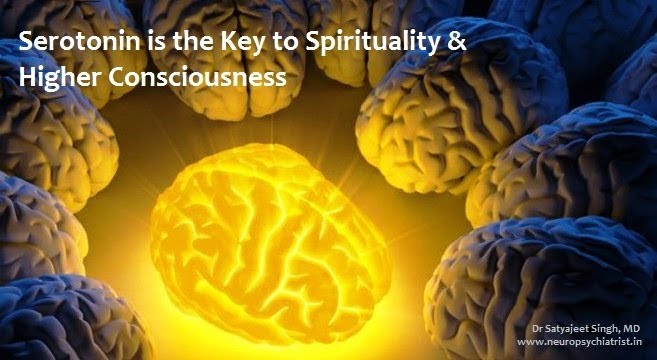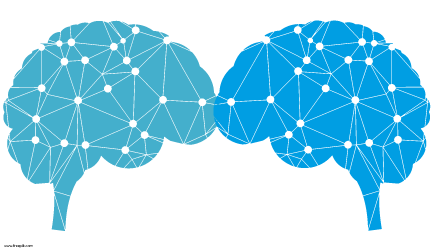Your brain has a negativity bias, but your mind can teach it to be happier
The term "negativity bias" refers to the brain's tendency to react more strongly to bad things - dangers, threats, mistakes, or problems - than to good things, such as pleasure, opportunity, and joy.
Although the negativity bias has helped humans survive by alerting us to possible threats, it makes it harder for us to relax, enjoy life, and be happy.
Luckily, your mind can train your brain to be happier. Focusing on and experiencing the positive aspects of life actually builds new neural structures in the brain.
This is another incredible way that your mind can change your brain for the better.
What you can do: Become aware of pleasant or happy experiences. Bring them to the foreground of your mind. Linger on these experiences for 5 seconds or more.
By doing so, you will rewire your brain, making it more likely that you will notice other positive things around you in the future.

Healthy bedtime rituals
Few healthy bedtime rituals, which everyone should adopt
The last few things you do before bed tend to have a significant impact on your mood and energy level the next day, as they often determine how well and how much you sleep.
1. Disconnect from work
Truly successful people do anything but work right before bed. Give yourself a buffer period between the time you read your last email and the time you go to bed. The idea is to get your head out of work before you lie down to go to sleep. It can be very hard not to do, or think about, work before bed. But developing this habit can pay off big time. It will help you go to bed feeling less stressed, and allow you to sleep better, with a clearer mind.
2. Unplug completely
You shouldn't just disconnect from work. You should unplug completely. Researchers agree that any kind of screen time before bed does you more harm than good. The blue light from your phone mimics the brightness of the sun, which tells your brain to stop producing melatonin, an essential hormone that regulates your circadian rhythm and tells your body when it's time to wake and when it's time to sleep. This could lead not only to poor sleep, but also to vision problems, cancer, and depression. So, stop checking email, scanning your social media apps, and playing games on your phone just before going to sleep.

3. Reflect
Successful people take the time just before bed to reflect on or write down three things that happened that day, for which they feel grateful. "Keeping a 'gratitude journal' also reminds people of the progress they made that day in any aspect of their life, which in turn serves as a key way to stay motivated, especially when going through a challenging period. "It's easy to fall into the trap of replaying negative situations from the day that you wish you had handled differently. Regardless of how badly the day went, successful people typically manage to avoid that pessimistic spiral of negative self-talk because they know it will only create more stress.. Analyze the same self-improvement question every night: "What good have I done today?". "Remember to take some time to reflect on the positive moments of the day and celebrate the successes, even if they were few and far between. Taking a few moments to think about what went right over the course of the day can put you in a positive, grateful mood." In addition to reflecting back on your day, take a few minutes to breathe, relax, and decompress. Meditation is one way to do this. Meditation is a great way to relax your body and quiet your mind.
4. Plan out your sleep
Simply make it a priority to get enough sleep - which can be a challenge for workaholics or entrepreneurs. One way to do that is to go to bed at a consistent time each evening, which is a key habit all sleep experts recommend to help ensure a healthy night's sleep. Set an alarm to remind yourself to get ready for bed. Forget the morning wake alarm.
5. Give up the nightcap and fattening snacks
Avoid alcohol right before bedtime. While alcohol can certainly help you fall asleep, the National Institute of Health finds that it robs you of quality sleep. Alcohol keeps people in the lighter stages of sleep from which they can be awakened easily and prevents them from falling into deeper, more restorative stages of sleep, the institute finds. You'll also need to avoid caffeine and foods that are high in fat right before bed.
CASE REPORT - British Medical Journal - BMJ Case Reports 2016; doi:10.1136/bcr-2016-215926
Partial Kluver-Bucy syndrome secondary to tubercular meningitis
Dr Satyajeet Kumar Singh, MD, Neuropsychiatrist, Aiims PatnaDepartment of Psychiatry, All India Institute of Medical Sciences, Patna, Bihar,
India
SUMMARY
Tubercular meningitis (TBM) is a devastating extra pulmonary manifestation of tuberculosis and demonstrates a high neurological morbidity. A rare complication of this condition is Kluver-Bucy syndrome (KBS), which is a neurobehavioral disorder characterized by hyper-sexuality, visual agnosia, bulimia, placidity, hyperorality and memory deficits caused by lesions to the amygdala. The amygdala lesions can be due to many causes, including traumatic brain injury, systemic conditions and infections such as tuberculosis. Here, we present a case of partial KBS in a patient undergoing treatment for TBM.

Strengths and the meaningfulness of single life
Single people are too often stereotyped and stigmatized. They are pitied while married people are celebrated. Yet single life can be tremendously meaningful and fulfilling. It is time for a more accurate, research-based portrayal of single people and single life - one that recognizes the real strengths and resilience of people who are single, and what makes their lives so meaningful.
(1) Single people rule. The number of unmarried Americans are more than married Americans.
(2) Single life is the better part of our adult lives. Americans spend more years of their adult lives unmarried than married.
(3) People who are "single at heart" embrace single life. Living single is how they live their best, most authentic, most meaningful lives. They are not single because they have "issues" or because they have not found "The One."
(4) Claims that getting married makes people happier, healthier, and more integrated into society are grossly exaggerated or just plain wrong.
(5) People who marry become more insular. They were more connected to parents and friends when they were single.
(6) Most of the studies indicating beneficial result of being married are based on matrimania as well as biased analyses
(7) In some studies, lifelong single people do better than everyone else, even when the analyses are biased against them
(8) Social scientists overwhelmingly study marriage and married people. Lifelong single people are mostly ignored, except as a comparison group in studies of marriage.

When people are drawn to single life and when they thrive there, it is for positive and deeply significant reasons, such as:
1. Singles savor their solitude and its profound rewards
2. Singles embrace bigger, broader meanings of relationships and love
3. They care about "the ones," not just The One
4. Singles develop a diversified portfolio of skills
5. The kinds of tasks that newly divorced and newly widowed people need to learn are ones that lifelong single people have already mastered
6. Singles contribute in meaningful ways. They do a lot of volunteering, and they do more than their share of caring for aging parents and people who need help for three months or more, even when those people are not family members
7. Singles value opportunities to pursue their interests and passions and do the work they care about the most. They care more about meaningful work than married people do
8. Lifelong single people develop a greater sense of autonomy over time than people who stay married
Lifelong single people experience more personal growth and development than people who stay married
THE SCIENCE OF EMOTIONS ( SEROTONIN IS THE KEY TO SPIRITUALITY & HIGHER CONSCIOUSNESS )
Scientists have for long suspected that serotonin influences spirituality. Receptor that regulates general serotonin activity in the brain correlates with people's capacity for transcendence, the ability to apprehend phenomena Drugs known to alter serotonin also induce mystical experiences. If this neurotransmitter is released in huge quantities into the body, the individual will reach a higher state of consciousness. An immense feeling of joy and happiness takes over. A feeling akin to pleasure and ecstasy sweeps through the being. 5 HT type 2 receptors are the receptors where the entire serotonin binds. Serotonin unlike other peptides has the power to hold sway over the human mind and body. Made up of tryptophan amino acid, serotonin is a potent mood booster. It is a powerful antidepressant and anti- anxiety peptide. At the physical level it has amazing anti-aging properties. It eliminates the free radicals that accelerate the aging process.
Serotonin contributes to the feeling of well-being and hence, is often referred to as the ‘happiness hormone'. It imparts a sense of love within the mind in an individual and is also actively involved in preventing depression and regulating sleep, appetite and body temperature.
Studies have revealed that serotonin is a potent accelerator critical to maturation of the brain. It has a powerful influence on the brain neurons responsible for mood, sexual desire and functioning, appetite, memory, learning and social behavior. Deficiency of the peptide can lead to autism and Down syndrome.
When serotonin is produced in a balanced amount an immense spiritual feeling takes over. Serotonin is the hormone and the neurotransmitter that makes one feel the spiritual bliss and well-being.

Dance in Rhythm
Silently or verbally chant divine love for better interpersonal relationship, cultivate unconditional love & forgiveness
We are all familiar with personal love as a deep, tender, ineffable feeling of affection we have toward treasured items in our lives. Often used as a term of endearment, we usually see personal love as an intense, emotional attachment or attraction to those we care about. With personal love we can lapse into our lower emotions and hold grudges against others, or concentrate on suffering. In doing so we hinder the effectiveness of our love in relationships, as well as, our own well being.
However, if we allow ourselves to focus on divine or unconditional love, we can learn to look at our glass of life, as being half full, instead of being half empty. In this way we can learn to transform our lower emotions of anger, jealousy, envy and greed into something positive. Pure, unconditional love, works without expectation, or attachment to the outcome, and asks for nothing in return. It's radiant light can resist and overcome every other energy it encounters, for it is the binding force of the universe.
So how do we bridge the gap between personal love and unconditional love? If we follow these simple steps, definitely it will be beneficial.
1). Learn how to love and accept yourself for who you are
2). Expect love in your life, in all your relationships, and with everyone else you encounter
3). Energy follows thought, If we think it, it will happen
4). Find goodness in others
Work for the highest good of all, by surrendering all your expectations
Obviously, you will need to do an enormous amount of inner work to find true, unconditional love in your life.
However, an exercise which is most valuable in shifting our vibration and consciousness is to silently or verbally chant divine love for five minutes to an indefinite amount of time. You will be amazed at how quickly your mood shifts to one of peace, and the outcome of any situation becomes favorable to all concerned. When we have love in our heart, life becomes a joy to behold!
The act of forgiveness helps us to develop and nourish love in our lives. Releasing blame and judgment of others is imperative to succeed, for forgiveness is a spiritual initiative grounded in the humility of accepting that we don't always need to be right. When we use our emotions or intellect as a rational explanation to forgive, we fail to see the very essence of what we are trying to achieve.
Forgiveness, being born from the heart, and not from the head, can teach us that we are all reflections of each other. In this way, we use the spiritual energy of love to assess our relationships by looking for similarities in people, rather than differences.

Support Your Mitochondria for Better Brain Health
Mitochondria are unique structures within every cell of your body. They are considered the "powerhouses of the cell," generating more than 90% of the energy in your body. Numerous studies show that there is a strong correlation between chronic dysfunction of the mitochondria and many psychiatric and neurodegenerative diseases, including:
1). - Major depressive disorder
2). - Bipolar disorder
3). - Multiple sclerosis
4). - Parkinson's disease
5). - Alzheimer's disease
6). - Chronic fatigue syndrome
7). - Schizophrenia
8). - Panic disorder
9). - Social anxiety
10). - Generalized anxiety and other stress-related diseases
Paying attention to your mitochondria is crucial for optimal brain and mental health, and luckily there are a number of dietary and lifestyle habits that can protect and support mitochondrial function.

The following steps will ensure your body and brain have healthier and more abundant mitochondria:
1). Eat nutrient-dense, whole foods, including plenty of fruits and vegetables
2). Avoid refined sugars, processed flours, industrial oils, trans fats, gluten and dairy
3). Eat organic grass-fed beef and wild-caught fish, or supplement with krill oil
4). Exercise
5). Try LLLT
6). Restrict calories and/or intermittent fast
7). Follow a cyclic ketogenic diet
8). Supplement with Resveratrol, NADH, B Vitamins, Ribose, CoQ10 and PQQ, Magnesium,ALCAR and/or RLA
Over time, if you follow these strategies, you can improve your mitochondrial health and naturally restore your mood and energy levels.

Tardive Dyskinesia, A Legacy of Past Treatment With Antipsychotics
TD can occur in patients who are taking or have taken Dopamine Receptor Blocking Agents.
The signs of TD have distinct characteristics
1). Athetoid and/or choreiform
2). Variable frequency and amplitude
Involuntary movements are often seen in the face, trunk, and extremities
1). Lips
2). Jaw
3). Eyes
4). Tongue
5). Trunk
6). Arms
7). Legs
8). Hands
9). Feets
Thousand of patients are left with tardive dyskinesia as legacy of past treatment with anti-psychotic agent. Tardive once established has proved to be irreversible in most cases.
The indication of anti-psychotics is now expanded as compared to in past. Clinician from other branch of medical science rather than neuro-psychiatrist
are inadvertently using this class of agent in excessive doses, for prolonged period of time, without any rational.
It is only to permanently damage your brain for ever. Recent studies reveals beneficial role of tetrabenzine in treatment.
Recent studies reveals beneficial role of tetrabenzine in treatment.
Recent studies reveals beneficial role of tetrabenzine in treatment.
Also the information provided will work as warning & eye opener for intelligent viewer of this site.
If your aged mother or father have developed tardive dyskinesia, be in panic, think of what to do ?
The best strategy is to do nothing.
The recent protocol for management of tardive dyskinesia is__Treating clinician are requested that if something have gone wrong, don't make it worse.
1). If there is emergence of tardive symptoms on typical antipsychotic, switch to an atypical agent (other than clozapine) & also discontinue anticholinergic.
It tardive symptoms improved, maintain atypical agent in lowest possible dose.
2). If tardive persist, try another atypical antipsychotic (other than clozapine, the previously tried atypical agent).
If tardive symptom improved, than it is good.Maintain the second atypical antipsychotic agent in lowest possible dose.
3). If tardive persist or become worse, try clozapine. If tardive improves, maintain clozapine in lowest possible dose.
4). If tardive persist, try suppression therapy with classical agent in combination with atypical agent (1st choice) or alone (2nd choice)
or withtetrabenzine (3rd choice) or consider adding BCAA (Branched Chain Amino Acid)
5). Other proposed treatment include donepzil, melatonin. Vitamin B 6 and Vitamin E
Excess of dopamine in the adolescent brain leads to errors in prediction
(Division of Humanities and Social Sciences and Computation and Neural Systems Program, California Institute of Technology, Pasadena, California)
Adolescence is associated with major social and cognitive changes, and it is known to be associated with an increased propensity for risky and impulsive behaviors compared with
other developmental stages.
Vigorous research and studies supports the the notion as it is due to hypersensitivity of the dopaminergic system.
Also the increased risk factors for maladaptive decision making are due to specific differences in the adolescent reward system.




